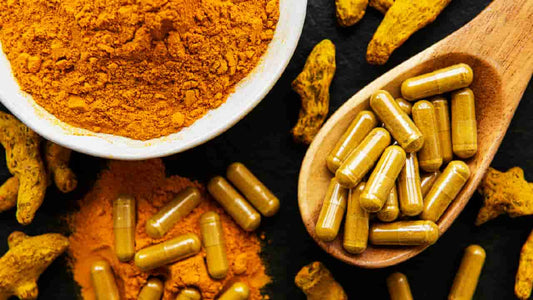MSM is a firm favorite when it comes to joint support.
And quite rightly so, the research to back up the claims of boosting immunity, reducing inflammation and relieving joint pain, is well documented.
But what exactly is it, and is it safe for long term use?
Before we delve into the details of MSM usage, let’s briefly go over what MSM is and the benefits of supplementation.
Key Takeaways
- Methylsulfonylmethane (MSM) is an organic, white crystalline substance composed of 34% sulfur. It serves as a building block for cartilage and connective tissues and helps form essential proteins such as keratin.
- The main benefits of MSM are reducing inflammation, relieving joint pain and muscle soreness, supporting the immune system and the health of skin, hair and nails.
- Current evidence suggests MSM is most likely safe for long-term use. Lower doses are recommended as a sustainable solution for long-term use to ensure optimal safety and efficacy.
- The best supplement stack that includes MSM (100mg OptiMSM®), glucosamine, chondroitin, turmeric, and boswellia serrata is Performance Lab® Flex . Combining these ingredients enhances joint support, reduces inflammation, and provides comprehensive benefits, making it an effective and safe option for long-term use.
MSM: A Quick Overview

Methylsulfonylmethane, commonly abbreviated to MSM, is an organic, white crystalline substance made up of 34% sulfur.
It’s essentially the building block of our cartilage and connective tissues and helps form essential proteins in our body, such as collagen and keratin.
MSM is found naturally in plants, animals, food, and humans, but is also widely available as a supplement.
You may see MSM as a standalone supplement or as a key ingredient in many joint support supplements alongside the likes of glucosamine and chondroitin, also two very popular joint supplements that work together to support overall joint and cartilage health.
MSM has many benefits, and not exclusive to joint health either. Let’s take a look!
Related Post: Glucosamine, Chondroitin, MSM: The Ultimate Joint Health Trio
The Health Benefits of MSM
Anti-inflammatory properties

MSM is thought to have potent anti-inflammatory properties that can offer a range of benefits, from reducing joint pain and swelling, to easing symptoms of allergies. Scientific research well-documents these anti-inflammatory effects.
MSM may lower inflammation by inhibiting the release of certain inflammatory substances, potentially helping to control the inflammatory response, particularly for joint conditions, seasonal allergies, and muscle soreness.(1)
For instance, MSM was shown to inhibit NF-kB, a protein complex involved in inflammatory responses.(2) It also reduced the production of cytokines such as tumor necrosis factor alpha (TNF-ɑ) and interleukin 6 (IL-6), which are signaling proteins linked to systemic inflammation. Additionally, MSM may contribute to the production of glutathione, a potent antioxidant produced by your body.
A double-blind, placebo-controlled trial involving 40 physically active men found that taking 3 grams of MSM before exhaustive exercise decreased the release of inflammatory cytokines and prevented the over-stress of immune cells, compared to a placebo.(3) This suggests that MSM not only helps reduce inflammation but also supports the immune system under stress.
May Ease Joint Pain

MSM is a popular supplement and is often labeled a staple supplement and a potential support to standard treatment among those suffering from arthritic conditions such as osteoarthritis, caused by wear and tear of the cartilage.
Research has shown that MSM may help reduce pain and inflammation associated with these conditions. For instance, a pilot clinical trial involving individuals with knee osteoarthritis demonstrated that taking MSM significantly reduced pain and improved physical function over a 12-week period compared to a placebo.(4)
Another randomized controlled study supported these findings, showing that patients with knee OA who took MSM for 12 weeks experienced small but significant improvements in physical function and total symptoms scores, though the clinical significance of these findings requires further investigation.(5)
MSM has been shown to help reduce pain and inflammation associated with these conditions, as well as preserve cartilage and increase the effectiveness of glucosamine and chondroitin, other key compounds found in cartilage and connective tissue.(1)
Helps Ease Muscle Soreness

Research has shown that MSM might be an effective remedy for muscle soreness. Due to the anti-inflammatory properties combined with the antioxidant properties, MSM is a fairly efficient supplement for speedy muscle recovery after exercise. MSM has been shown to decrease exercise-induced oxidation, which often causes sore muscles after a workout.
During exhaustive exercise, muscle damage occurs and oxidative stress increases. This causes athletes to experience muscle soreness and pain, hindering athletic performance and training. MSM can naturally speed muscle recovery by reducing inflammation and oxidative stress.
In one study, 18 male participants took 50 mg of MSM powder per kg of body weight for 10 days. The results showed a reduction in exercise-induced muscle damage and an increase in antioxidant activity following an 8.7-mile run.(6)
In another placebo controlled study, 22 healthy women who were training for a half marathon took 3g of MSM (or a placebo) in the 3 weeks before the marathon. The group taking MSM reported less muscle soreness and joint pain than the placebo group.(7)
These studies indicate that MSM may help reduce pain, muscle damage, and oxidative stress after intense exercise and may aid in quicker recovery.
Supports Immunity

Studies have shown that MSM could be beneficial for reducing oxidative stress and inflammation. Both of which can have a negative impact on our immune systems. MSM provides sulfur, which supports the body's production of glutathione, a powerful antioxidant. Good levels of glutathione result in a stronger, healthier immune system.
The immune system is a specialized network of tissues, cells, and organs that protect the body against illness and disease. It can be weakened by factors such as stress, illness, a poor diet, insufficient sleep, or lack of activity. Sulfur compounds like MSM play important roles in the health of the immune system. MSM may be effective in reducing oxidative stress and inflammation that can weaken immunity by reducing levels of inflammatory compounds like IL-6 and TNF-ɑ, in turn reducing stress on the immune system.
Additionally, MSM plays a part in the creation of glutathione, the body's master antioxidant, and may help increase levels of this important compound. Having adequate levels of glutathione is crucial for the overall health and function of the immune system.
May Improve Skin Health

Keratin, a protein rich in the sulfur-containing amino acid cysteine, serves as the main structural component of hair, skin, and nails. The high sulfur content in keratin is why burnt hair emits a distinctive sulfurous smell.
MSM may benefit skin health by serving as a sulfur donor to keratin, helping to synthesize this vital protein. By supporting keratin production, MSM promotes the structural integrity of skin, making it more resilient and healthier.
In addition to aiding keratin synthesis, MSM may help reduce inflammation, which can damage skin cells and lead to premature aging signs like wrinkles. This anti-inflammatory effect may also alleviate symptoms of problematic skin conditions such as rosacea, which causes redness, irritation, and inflammation of the skin.
A study demonstrated that applying MSM to the skin significantly improved redness, itching, inflammation, hydration, and skin color in people with rosacea.(8) This suggests that MSM not only supports skin health through keratin enhancement but also by mitigating inflammatory skin conditions.
So, now we know what MSM is and what it does, let’s look at how best to take it to reap these benefits!
If you want to learn more about the benefits of taking MSM supplements, check out our linked guide.
How to Take MSM
Research has suggested that MSM is most effective when taken alongside the likes of glucosamine and chondroitin.(1)
Performance Lab® Flex is the best joint supplement stack on the market at the moment, combining MSM (as 100mg OptiMSM®), glucosamine, chondroitin, turmeric and boswellia serrata, all helping to lubricate joints, absorb shock, support ligaments, tendons, and cartilage, and relieve stiff, achy joints.
MSM is also best taken when it’s in the form of OptiMSM®, the purest and best quality available.
Safety of MSM Supplements
MSM Short-Term Use
Methylsulfonylmethane (MSM) is generally considered safe for short-term use. Several studies have been conducted to assess its safety profile over periods ranging from a few weeks to a few months.(9) These studies often involve various dosages to determine the optimal and safe range for human consumption.
Common Side Effects
The most commonly reported side effects of MSM are mild and infrequent. They include:
- Digestive Issues: Some users may experience nausea, diarrhea, bloating, or stomach discomfort. These symptoms are typically mild and subside as the body adjusts to the supplement.
- Headaches: A few individuals have reported mild headaches when starting MSM.
- Allergic Reactions: Although rare, some people may experience allergic reactions such as skin rashes, itching, or swelling. It's recommended to discontinue use and consult a healthcare provider if any allergic symptoms occur.
Most short-term studies conclude that MSM is well-tolerated, with side effects being minimal and often transient. The general consensus is that MSM, when taken within the recommended dosage range, poses little risk for short-term use.
MSM Long-Term Use
Long-term studies on MSM are less prevalent compared to short-term studies, but the available evidence suggests that MSM can be safe for extended use.
Typical Duration and Design of Studies on MSM
Long-term studies typically involve a randomized, double-blind, placebo-controlled design to ensure reliability and minimize bias. Participants are usually divided into groups receiving varying dosages of MSM, with regular monitoring to assess any changes in health status, side effects, and overall efficacy.
For example, in a pilot clinical trial investigating MSM for osteoarthritis, participants took MSM for 12 weeks with positive outcomes and minimal side effects reported. However, studies extending beyond this period are limited and call for more extensive research.
The typical duration of these studies ranges from three months to a year.
Researchers focus on:
- Efficacy in Long-Term Use: Monitoring improvements in symptoms related to conditions such as osteoarthritis, joint pain, and inflammation.
- Safety and Tolerability: Regular assessments to document any adverse effects, changes in blood chemistry, and overall health.
- Quality of Life Measures: Evaluations using instruments like the SF-36 health survey to gauge participants' overall well-being and functional improvements.
Current evidence points to the safety of long-term MSM use, though additional studies would be beneficial to further investigate its long-term effects..
Dosages
When it comes to dosages, in much research, dosages of up to 4-6g daily have been used, though it’s unclear what the long-term effects of this would be.
This is why it’s recommended to take a lower dose of MSM alongside other joint supplements to ensure minimal side effects, safe long-term use, and the most effective outcome upon stacking with other joint supplements.

There is no definitive answer to how long you can take MSM as a high-dose, standalone supplement.
However, when taking Performance Lab Flex, you have the benefit of knowing the safety and efficacy of long-term use, so it appears less is better in this case!
Related Post: How Long Does It Take for MSM To Work?
Summary
MSM is an effective supplement commonly taken to help relieve joint pain and stiffness, reduce inflammation, ease muscle soreness and boost our immunity.
While it’s generally shown to be safe to use in the short-term, the safety of long-term use of the typical high doses often reported in literature is yet to be determined.
For now, it appears that less is better, with smaller doses being not only effective, but safe for long-term use.
A good example being Performance Lab Flex, which offers 100mg OptiMSM® alongside many other effective joint supplements and shown to be effective and safe.
- Butawan M, Benjamin RL, Bloomer RJ. Methylsulfonylmethane: Applications and Safety of a Novel Dietary Supplement. Nutrients. 2017;9(3):290. Published 2017 Mar 16.
- Lawrence T. The nuclear factor NF-kappaB pathway in inflammation. Cold Spring Harb Perspect Biol. 2009 Dec;1(6):a001651. doi: 10.1101/cshperspect.a001651. Epub 2009 Oct 7. PMID: 20457564; PMCID: PMC2882124.
- van der Merwe M, Bloomer RJ. The Influence of Methylsulfonylmethane on Inflammation-Associated Cytokine Release before and following Strenuous Exercise. J Sports Med (Hindawi Publ Corp). 2016;2016:7498359. doi: 10.1155/2016/7498359. Epub 2016 Oct 23. PMID: 27844051; PMCID: PMC5097813.
- Kim LS, Axelrod LJ, Howard P, Buratovich N, Waters RF. Efficacy of methylsulfonylmethane (MSM) in osteoarthritis pain of the knee: a pilot clinical trial. Osteoarthritis Cartilage. 2006 Mar;14(3):286-94. doi: 10.1016/j.joca.2005.10.003. Epub 2005 Nov 23. PMID: 16309928.
- Debbi EM, Agar G, Fichman G, Ziv YB, Kardosh R, Halperin N, Elbaz A, Beer Y, Debi R. Efficacy of methylsulfonylmethane supplementation on osteoarthritis of the knee: a randomized controlled study. BMC Complement Altern Med. 2011 Jun 27;11:50. doi: 10.1186/1472-6882-11-50. PMID: 21708034; PMCID: PMC3141601.
- Barmaki S, Bohlooli S, Khoshkhahesh F, Nakhostin-Roohi B. Effect of methylsulfonylmethane supplementation on exercise - Induced muscle damage and total antioxidant capacity. J Sports Med Phys Fitness. 2012 Apr;52(2):170-4. PMID: 22525653.
- Withee ED, Tippens KM, Dehen R, Tibbitts D, Hanes D, Zwickey H. Effects of Methylsulfonylmethane (MSM) on exercise-induced oxidative stress, muscle damage, and pain following a half-marathon: a double-blind, randomized, placebo-controlled trial. J Int Soc Sports Nutr. 2017 Jul 21;14:24. doi: 10.1186/s12970-017-0181-z. PMID: 28736511; PMCID: PMC5521097.
- Berardesca E, Cameli N, Cavallotti C, Levy JL, Piérard GE, de Paoli Ambrosi G. Combined effects of silymarin and methylsulfonylmethane in the management of rosacea: clinical and instrumental evaluation. J Cosmet Dermatol. 2008 Mar;7(1):8-14. doi: 10.1111/j.1473-2165.2008.00355.x. PMID: 18254805.
- Butawan M, Benjamin RL, Bloomer RJ. Methylsulfonylmethane: Applications and Safety of a Novel Dietary Supplement. Nutrients. 2017 Mar 16;9(3):290. doi: 10.3390/nu9030290. PMID: 28300758; PMCID: PMC5372953.














